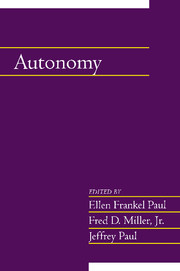Book contents
- Frontmatter
- Contents
- Introduction
- Acknowledgments
- Contributors
- Stoic Autonomy
- Autonomous Autonomy: Spinoza on Autonomy, Perfectionism, and Politics
- Kant on the Theory and Practice of Autonomy
- How Much Should We Value Autonomy?
- Autonomy, Duress, and Coercion
- Autonomy and Hierarchy
- Reason and Autonomy
- Identification, the Self, and Autonomy
- Some Tensions between Autonomy and Self-Governance
- Autonomy from the Viewpoint of Teleological Behaviorism
- The Paradox of Group Autonomy
- Abortion, Autonomy, and Control over One's Body
- Freedom as a Political Ideal
- Index
Some Tensions between Autonomy and Self-Governance
Published online by Cambridge University Press: 06 July 2010
- Frontmatter
- Contents
- Introduction
- Acknowledgments
- Contributors
- Stoic Autonomy
- Autonomous Autonomy: Spinoza on Autonomy, Perfectionism, and Politics
- Kant on the Theory and Practice of Autonomy
- How Much Should We Value Autonomy?
- Autonomy, Duress, and Coercion
- Autonomy and Hierarchy
- Reason and Autonomy
- Identification, the Self, and Autonomy
- Some Tensions between Autonomy and Self-Governance
- Autonomy from the Viewpoint of Teleological Behaviorism
- The Paradox of Group Autonomy
- Abortion, Autonomy, and Control over One's Body
- Freedom as a Political Ideal
- Index
Summary
INTRODUCTION
The notions of autonomy and self-governance each capture something crucial about the moral dimensions of agents and actions. These notions are central to the ways in which we conceptualize ourselves and others. The concept of autonomy is especially crucial to understanding the distinct status of moral agents. For its part, self-governance has a significant relation to the evaluation of agents as individuals with particular characters, leading particular sorts of lives, and performing particular actions. Neither notion—autonomy nor self-governance—fully assimilates or dominates the other. Moreover, there are some important strains between them. There are certain forms of regard that the autonomy of an agent demands that are at odds with what an agent's exercise of self-governance merits. In this essay I plan to show this, and offer a diagnosis of why this is the case.
The discussion will proceed as follows. In Sections II and III of this essay, I shall suggest general ways in which considerations concerning autonomy and self-governance are distinct and also very important to moral theorizing. In Sections IV and V, I shall look at ways in which these considerations bear upon responsibility for character and action. In Section VI, I shall consider how the foregoing discussion raises important questions concerning the justification of punishment. Then, in Section VII and the brief concluding section, I shall look at why there are certain ways in which considerations of moral psychology having to do with self-governance put pressure on normative considerations having to do with autonomy.
- Type
- Chapter
- Information
- Autonomy , pp. 221 - 244Publisher: Cambridge University PressPrint publication year: 2003



